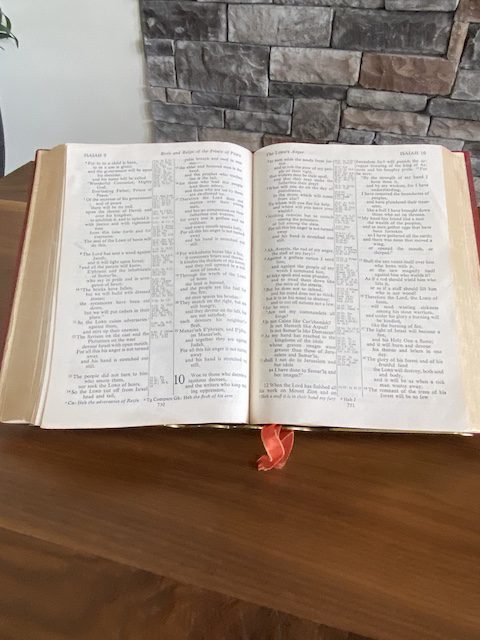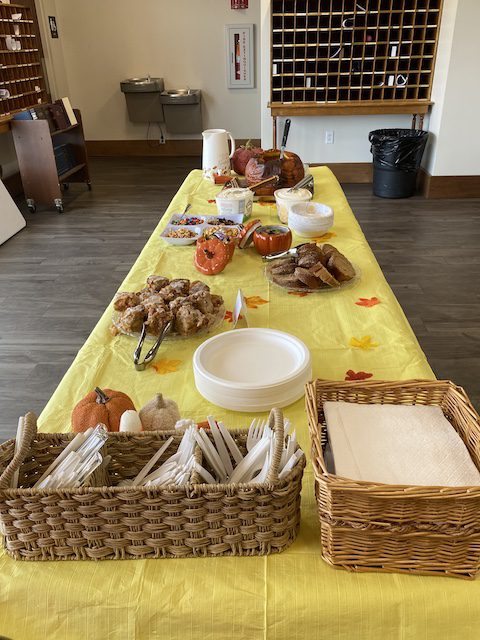


During the Women’s Ministry craft event at church on Saturday afternoon, I could easily recognize my strengths—and lack thereof. I’d baked an apple cider-doughnut Bundt cake and an apple fritter cake, a first-time recipe made with gluten-free flour, the latter to rave reviews. But when it came to the craft itself, my creative risk-taking shrank. I copied the sample as best I could.
A “recognize and know thyself” situation.
While listening to the honest, easy flow of conversation among the women around the table, I thought about the fundamentals I recognize, now that I’m a believer in the second half of life.
Recognize Christ’s divinity
Simon Peter answered, “You are the Messiah, the Son of the living God.” Matthew 16:16 NIV
Here, Peter’s confession shows his recognition of Jesus’s divine identity. We also recognize the same fundamental during the service every Sunday by confessing our faith in reciting either the Apostle’s Creed, the Nicene Creed, or the Athanasian Creed. All serve as statements of faith.
The Nicene Creed was written in the 4th century AD in response to religious disputes, particularly from the followers of the heretic Arius. He promoted the belief that the biblical concept of the Son begotten of the Father implied that the Son is not eternal, and thus was not divine and different from us humans. The conflict was as critical as the first-century Gnostic heresies, and quite frankly, these heresies are alive and well today. How delicious to think that we can be as perfect as Jesus, that we are in control, that we can be our own little gods.
How much greater the gift of imperfection, that allows us to recognize ourselves for who we really are: both sinners and saints. In church yesterday, we confessed, “…we have not always listened to Your Word, but listened instead to other voices not aligned with Your Truth.” I recognize myself as one of the “not always, but instead” we.
Recognize spiritual truths
If anyone thinks they are a prophet or otherwise gifted by the Spirit, let them acknowledge that what I am writing to you is the Lord’s command. 1 Corinthians 14:37 NIV
In his letter to the Corinthians, Paul stands on the authority of the Scriptures, not his own opinions. He challenges the church in Corinth to recognize his teachings as being directed by the Lord.
In asserting his authority, Paul does not elevate himself—it is important to be humble and recognize one’s own fallibility—but elevates the fact of the commandments of the Lord. Recognize the source of my teachings, Paul urges, and submit to the will of God as revealed through His Words.

Paul clearly had the spiritual gifts of teaching and leadership. And we, too, should recognize and use our gifts in sharing the love and life of Jesus Christ. As we women did, while listening to one another and gluing the words “Blessings, Grateful, and Thankful” to our seasonal crafts.
Recognize people’s actions
Thus, by their fruit you will recognize them. Matthew 7:20 NIV
The context of this passage is important, for Jesus was warning about false prophets or teachers, who claim to know and follow the Lord and His Word and His commandments but do not. To recognize these wolves in sheep clothing, evaluate their “fruit,” the results of their ministry, the yield, the lasting effect. Honest teaching yields good outcomes. False teaching, that is, man-made in the place of the Word of God, yields “bad fruit,” the absence of godliness and spiritual growth.
Faith needs to be operative and dynamic rather than inoperative and lifeless. Or as James wrote, In the same way, faith by itself, if it is not accompanied by action, is dead. James 2:17 NIV
These fundamentals—Christ’s divinity, His truths, and our gifts in action—please and glorify the Lord. If we recognize the fundamentals of faith every day, we will know again. And share that loving knowledge through our words and the work of our hands.
Linkup with Five Minute Friday
Notes from Vanaprastha Podcasts on my YouTube Channel: https://www.youtube.com/@CaroleDuff



0 Comments